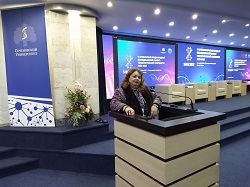On November 8-9, 2022, the VI Sechenov International Biomedical Summit: Technological Sovereignty (SIBS – 2022) was held in Moscow. The platform for discussion of digital medicine for the universities-members of the Russian-Chinese Association of Medical Universities (RCAMU) was the Congress Center of the First Moscow State Medical University named after I.M. Sechenov.
The summit brought together leading scientists from medical universities of Russia from Petrozavodsk to the Amur River region. Chairman of the State Duma Committee on Science and Higher Education of the Russian Federation S.V. Kabyshev, Vice-President of the Russian Academy of Sciences M.A. Piradov, Director of the Department of Scientific and Technical Programs of the Ministry of Science and Higher Education of the Russian Federation Chaban E.A. welcomed the participants. The opening ceremony was held by the rector of Sechenov Medical University, academician of RAS P.V. Glybochko, co-chairman of the summit and RCAMU.
From the Chinese side, Yang Baofeng, an academician of the Chinese Academy of Engineering Sciences, acted as co-chairman of the summit and RCAMU. Zhang Xue, rector of Harbin Medical University, Academician of the Chinese Academy of Engineering Sciences, welcomed the summit.
Within two days, Russian and Chinese scientists were able to discuss the most important issues of telehealth technologies, application of mathematical modeling in various fields of medicine, possibilities of artificial intelligence, engineering schools and other aspects of digital medicine. From Kursk State Medical University, the report “Opportunities of Telehealth in Educational Segment of Medical University” was presented by the Head of the Department of Pharmacology Professor Mal G.S. The purpose of the summit was to exchange experience and knowledge, expand opportunities for cooperation in the development of telehealth systems of medical education, which corresponds to the tasks of concrete implementation of strategic plans of the priority national project.
The summit programme was very rich. Numerous symposia and schools discussed modern aspects of training medical personnel in Russia, development trends and quality of medical education, competency-based approaches, etc. During the two days, the participants of the summit discussed not only promising educational technologies in medicine, but also joint scientific and educational projects. We would like to express gratitude to the administration of KSMU for the opportunity to participate in such events, which allow expanding the horizons of interuniversity scientific relations.
Mal G.S., Professor, Head of the Department of Pharmacology

